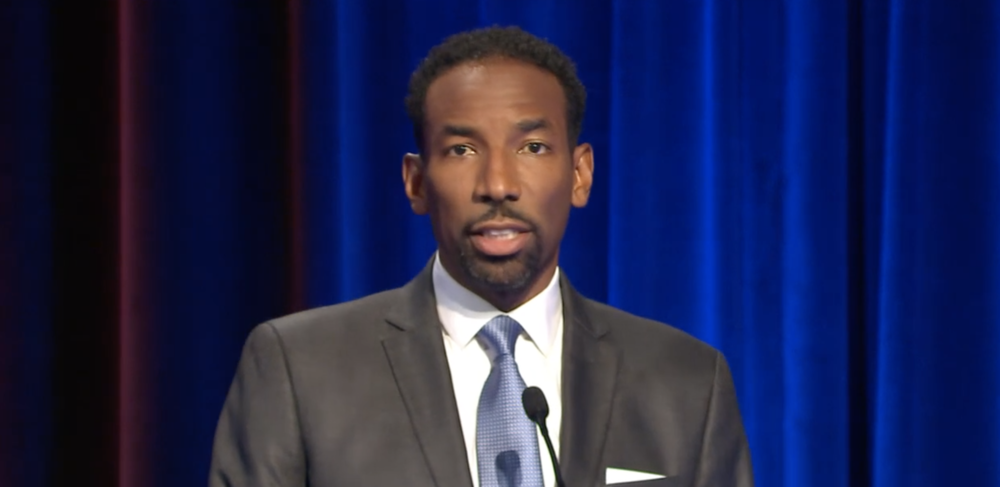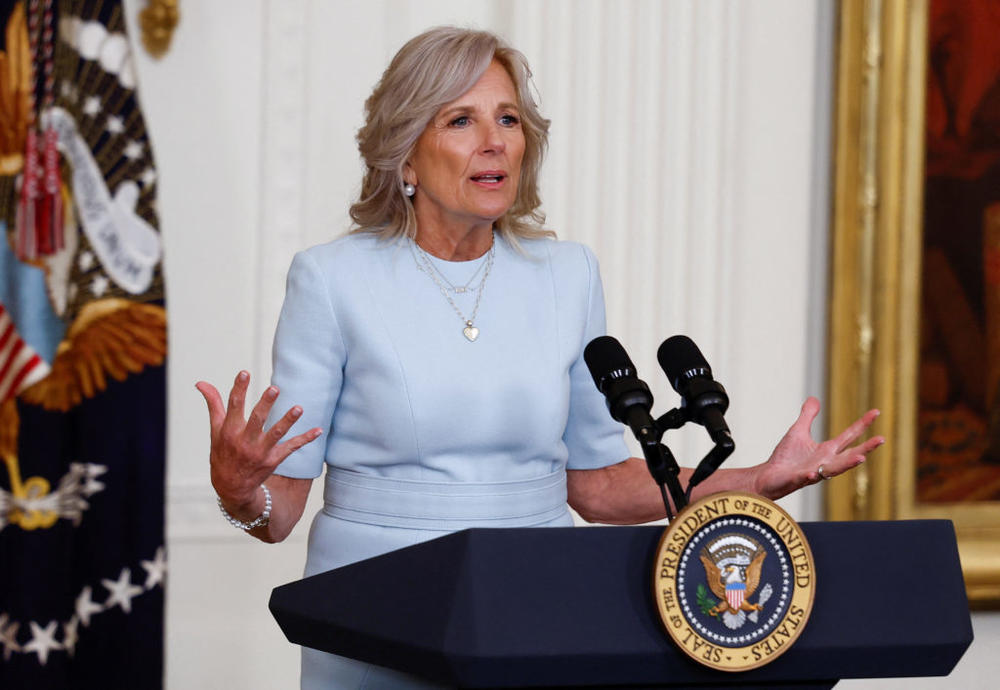
Section Branding
Header Content
Georgia Today: Brothers arrested for Jan. 6 connection; Film tax credit; Jill Biden visits Atlanta
Primary Content
LISTEN: On the Thursday, Feb. 8 edition of Georgia Today: Two Georgia brothers have been arrested in connection with the January 6th attack of the U.S. Capitol; leaders in the state House and Senate want to make changes to Georgia's film tax credit; and first lady Jill Biden visits Atlanta to talk Women's Health.

Peter Biello: Welcome to the Georgia Today podcast from GPB News. Today is Thursday, Feb. 8. I'm Peter Biello. In today's episode: two Georgia brothers have been arrested in connection with the Jan. 6 attack on the U.S. Capitol. Leaders in the state House and Senate want to make changes to Georgia's film tax credit, and first lady Jill Biden visits Atlanta to talk women's health. These stories and more are coming up on this edition of Georgia Today.

Story 1:
Peter Biello: Atlanta police have arrested a man in connection with a series of arsons blamed on opponents of a planned public safety training center. 30-year-old John Robert Mazurek was taken into custody early this morning. Atlanta Mayor Andre Dickens says project opponents have the right to be heard, but not to put others in danger.
Andre Dickens: They use misinformation and technology to attempt to recruit others into their violent cause. They have a destructive agenda.
Peter Biello: He said construction of the training center is ongoing and is expected to be complete by the end of the year. Last July, explosives set off at a precinct destroyed eight police motorcycles and attacks blamed on project opponents.
Story 2:
Peter Biello: Two brothers from Georgia have been arrested in connection with the Jan. 6 attack on the U.S. Capitol. Cepane Sarty of Marietta and Seth Sarty of Rockmart have been charged with a felony for assaulting, resisting or impeding officers. They also face misdemeanors for entering the Capitol and disorderly conduct and physical violence inside the Capitol. More than 1,300 people have been charged in nearly all 50 states in connection with the incident. More than 450 have been charged with the felony of assaulting or impeding law enforcement.
Story 3:
Peter Biello: Leaders in the state House and Senate want filmmakers to do more to get the top benefit from Georgia's lucrative film tax credit. House Speaker Jon Burns yesterday proposed major changes to the tax breaks, including shooting in rural Georgia and hiring more Georgia workers.
Jon Burns: We want to make sure those investments are saving and creating jobs in our state, in our local communities, but for the very best return on investment that we can possibly receive, because at the end of the day, that's our job.
Peter Biello: Under the proposal, companies would have to meet four of nine goals to receive the top tax credit. The tax breaks cost the state an estimated $1.3 billion and support thousands of jobs.

Story 4:
Peter Biello: First lady Jill Biden visited Atlanta yesterday to talk about women's health. GPB's Amanda Andrews reports, she spoke with local advocates, researchers and investors.
Amanda Andrews: The first lady launched an initiative in November 2023 focusing on women's health care and equity. The goal is to help determine where to invest money and partner with researchers to improve women's health. Dr. Tene Lewis, a professor and researcher at Emory University, served as a panelist during the discussion with Biden. She says she's looking to partner with companies to create more inclusive equipment.
Tene Lewis: So sometimes the largest arm cuffs cannot accommodate larger arms. We have larger body sizes in the South. African American women are more represented in these larger body sizes. We can't assess these women.
Amanda Andrews: The Biden administration has previously given federal funds to address women's health issues through the CARES act. For GPB News, I'm Amanda Andrews.
Story 5:
Peter Biello: The Georgia House is backing changes to the state budget that would boost state spending, even though growth in tax collections is slowing. GPB's Sarah Kallis reports.
Sarah Kallis: The mid-year budget adds $5 billion into the 2024 budget. House Appropriations Chair Matt Hatchett says the extra money comes from an increase in revenue and surplus funds.
Matt Hatchett: $5 billion. You can do a lot of good with $5 billion.
Sarah Kallis: The increased money will go towards infrastructure improvement, mental health support and other priorities, including higher education. The Senate still has to approve the budget before it heads to Gov. Kemp's desk. For GPB News, I'm Sarah Kallis at the state Capitol.

Story 6:
Peter Biello: American suburbs are often seen as the keeper of a particular version of the American Dream: good schools, solid infrastructure, and responsive and responsible government. But for many Americans, that promise goes unfulfilled. According to author Benjamin Herold, post-World War II suburbia has become something of a Ponzi scheme. He describes that scheme in his new book, Disillusioned: Five Families and the Unraveling of America's Suburbs. One of those families in the book is from Gwinnett County. Benjamin Herold.
Benjamin Herold: It's great to be here. Thanks for having me.
Peter Biello: You write here in this book, Disillusioned, that there has been, over the last century or so, a series of life stages for suburban communities. And that life cycle has primarily benefited, white people who are often the first residents of a new suburban community. Can you talk to us a little bit about those life stages?
Benjamin Herold: Yeah. I mean, I think what we've seen again and again in America's postwar suburbs in particular is you had communities that were built up really almost overnight. So you had farmland that was turned into subdivisions and became bustling suburban communities in the span of five, 10 years in many places. Really quick development. And those early suburbs, there's two things that are important to remember about them. One is that they were racially segregated by design. That was a matter of both policy and informal practice and really designed for middle class and upwardly mobile white families and really gave families like mine a really tremendous deal. It was a very generous social contract. You got not only cheap mortgage loans and massive tax breaks but also all of this brand-new infrastructure and public school systems that really had a chance to create in our own image. And so there's a reason people were so drawn to the suburbs. Like, it's a great deal. But part of what made that deal possible was putting the true costs of not only building the infrastructure, but maintaining, repairing and renewing, all of that ... Putting it off onto the future. Just on to some future generation. And what we've seen again and again — in particularly, Atlanta suburbs are a great example of this — is that as other communities, Black and brown families, immigrant families, etc., fought to get into suburbia, to get that same deal, right as they're starting to get in, many of these communities are starting to experience a lot of problems. You start to see the bills start to come due for repairing roads, sewers and sidewalks that are all in need of repairs all of a sudden, because they were all built almost overnight. For school systems that are slow to change. All of this kind of comes at once. And so the families that have means, historically, have just left right before the bills come due. And what that results in is that the families who come in behind end up not only not getting that same generous social contract, but also, in effect, paying for the opportunities that somebody else has already extracted.
Peter Biello: You profiled one family from Gwinnett County here, the Robinsons. At what stage was their community?
Benjamin Herold: So, the Robinsons are an upwardly mobile African American family. Middle class family. Multiple advanced degrees, both professional jobs, super-invested in their kids education. And so they moved out to Buford, in northern Gwinnett County, in 2012. And their sense was really like, "Hey, this is a place where we think we can kind of buy into that suburban dream. We'll get the nice house. It's in a good neighborhood. It's attached to highly regarded public schools. We can kind of set it and forget it." And so what they actually ended up experiencing, though, was that the first signs that something were off started when their oldest son, Corey, an African-American boy, started middle school. And all of these kind of disciplinary issues started happening all of a sudden. So instead of the opportunities and grace that I received when I grew up white in suburbia in the '70s and '80s, all of a sudden their child is starting to receive these kind of really harsh punishments and messaging around things like tapping his pencil too loudly in class or being too rough with his friends and just kind of normal teenage boy stuff. And it starts to really escalate. And so with the Robinsons' family really had to contend with is like, "Hey, we've organized our whole life around being in this community and having access to these public schools, and now they're actually a threat to our child. We see them kind of dimming his light and kind of telling him that who he is is not okay." And so they're forced to kind of make this decision about temporarily pulling him out of Gwinnett County Public Schools, considering private schools, just going through all this angst because the community is changing on the ground. The families who live in Gwinnett, the families who send their kids to Gwinnett County Public Schools have changed. But the leadership, policy, culture and practices of Gwinnett County Public Schools had not. And we saw that big picture around the same time period with, you know, really contentious fights around the control of the Gwinnett County School Board in 2020 and '22.
Peter Biello: Race was a factor, not just in Gwinnett County, but in all five communities that you've profiled for this book and some of the decisions involved in living in or moving to or moving on from a suburban community relied on what you described repeatedly as a racial "need not to know." Can you describe what you meant by that?
Benjamin Herold: Yeah. ... There's a philosopher named Charles Mills, and he — he talked about this. And it's kind of —The way I've come to think of it is it's almost like a willful ignorance that white Americans in particular have a habit, have a tendency of really embracing so that we don't have to reckon with the realities of race in America. Like, we're not blind. When we're children, we have these moments and experiences and encounters where we realize, "Oh, wait. What's actually happening in the world around us, particularly for the Black and brown people we may go to school with or live in the same neighborhood with, or share a community with, they're receiving very different treatment and experiences than we're receiving. And it kind of goes against these ideals of America that we've been taught."
And so we try and reconcile that. And often it's very hard to do, because doing that means acknowledging the racial advantages that we've received. Acknowledging the injustices upon which suburbia, for example, was founded — that history of racial exclusion we were talking about. We don't really have a very good way of systemically incorporating that into our sense of how a community should work and operate. And as a result, we end up, y'know, missing a lot of these dynamics. And I think that's part of why this moment suburbia is in now is so fraught, is because all of a sudden, white Americans are really being forced to confront these truths and realities that we've needed not to know and chosen not to know for a really long time.
Peter Biello: Lots of people profiled here, in particular the white family from Texas, approached their choices by thinking about what was best for their family, not necessarily for the community as a whole. And many of these people, when possible, would simply move their family out of a school system that wasn't working for them, rather than fix the system. And this kind of mentality, this kind of just move on when it's no longer a good fit for you or working out the way you want it to work out — it strikes me as rational, but not particularly hopeful for the well-being of the suburbs. I was wondering what you thought.
Benjamin Herold: I agree with that, absolutely. I think that part of the challenge with us recognizing this as many of these decisions that we make as families on kind of a day-to-day level, they make sense. Everyone wants what's best for their kids. They want the best future. They want a safe place to live. They want good schools. It's understandable that we want all of those things. The problem is that we have designed communities that are predicated on giving as much of that as possible to just a couple generations of families without paying for it, and without having a plan for how to extend and renew it in the future. And so it's hard because that is really deep-rooted in our national psyche, this idea that we have to do what's best for our own families. What we have to figure out is not only how do we do what's best for our own families, but how do we create communities that sustain and maintain that kind of social contract across generations?
Peter Biello: Benjamin Herold is the author of Disillusioned: Five Families and the Unraveling of America's Suburbs. Thank you so much for speaking with me.
Benjamin Herold: Thank you for having me.
Peter Biello: And that is it for this edition of Georgia Today. If you want to learn more about any of these stories, visit GPB.org/news. And if you haven't subscribed to this podcast yet, do it now. We'll be back in your podcast feed tomorrow afternoon. And if you've got feedback or a story idea, we would love to hear from you. Email us. The address is GeorgiaToday@GPB.org. I'm Peter Biello. Thanks again for listening. We'll see you tomorrow.
---
For more on these stories and more, go to GPB.org/news



